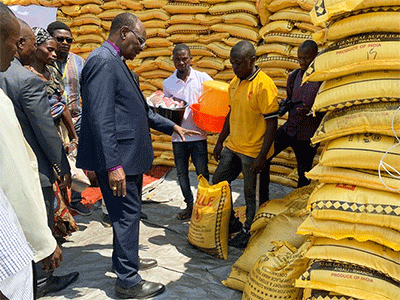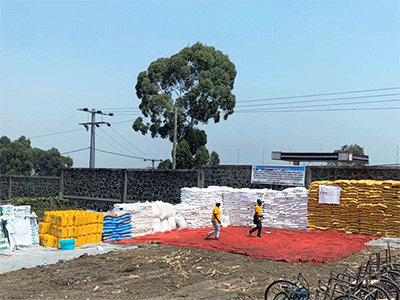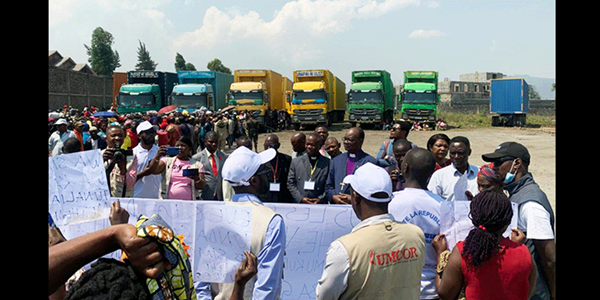More than 15,000 displaced people from some 3,000 households received food, hygiene kits and other essential support from The United Methodist Church.
The gifts were made possible by a $250,000 grant from the United Methodist Committee on Relief and United Methodist Global Ministries’ Global Health program.
Your gifts on UMCOR Sunday helps support the foundation for the United Methodist Committee on Relief (UMCOR) to share God’s love with communities everywhere.

The distribution operation was launched by Bishop Gabriel Yemba Unda, Eastern Congo Episcopal Area, during sessions of the Kivu Annual Conference.
Jean Tshomba, coordinator of the United Methodist Committee on Relief’s disaster management office in eastern Congo, reported that UMCOR funds had enabled the purchase of 75 tons each of rice and flour, 12.5 tons each of beans and vegetable oil, 2.5 tons each of table salt and sugar, as well as other items.
According to Cudins Lokale Senga, deputy coordinator of finance for the disaster management office, each household received rice and maize flour, beans and sugar, a gallon of vegetable oil, cooking salt, two bars of soap, a basin, a bucket, brooms, toothpaste, toothbrushes and other basic necessities. The goods were distributed in July.

“Some 600,000 displaced people are living in extremely precarious conditions,” said Tshomba. “They face inadequate access to food, water and hygiene facilities, which exposes women to sexual violence.”
Alfred Kimenya oversees the camp for displaced people at the Don Bosco site in Goma.
“The act of The United Methodist Church in favor of the war-displaced people of Rutshuru and Masisi,” he said, “is not the first, even though there are several religious denominations in the DRC. I congratulate the team that has started to register the displaced people on this site because they didn't take into account religious or tribal criteria. On the contrary, they took into account vulnerability criteria, cases of malnutrition in households and age.”
In addition to providing food, the church also has addressed poor hygienic conditions in the camps.
Dr. Damas Lushima, health coordinator for the East Congo Episcopal Area, said the intervention is needed.
“UMCOR and Global Health have seen fit to help women living in displaced persons’ sites by providing them with hygiene kits that enable them to take care of themselves, particularly during menstruation. We sensitized the population to the use of long-term hygiene kits before proceeding with distribution.”
The emphasis on hygiene sensitization was one of the highlights of the intervention, said Bintou Diao, program manager for UMCOR’s International Disaster Response program.
“The health board team has facilitated the introduction of a more sustainable solution with the provision of reusable sanitary pads, which requires menstrual hygiene management education. … Through collaborative responses with Global Health, we aim for a more holistic approach in providing relief to displaced people,” Diao said.
In May, two rivers overflowed following torrential rains, killing more than 400 people in the area. One church family lost 13 members.
In August, a fire ravaged the camp for flood victims in Kalehe. Seven people were killed, and over 400 makeshift shelters were reduced to ashes, leaving displaced people homeless.
On Sept. 12, UMCOR released a $10,000 emergency grant in solidarity with the East Congo Episcopal Area to address urgent food needs for people affected by the fire, while damage and needs assessments are being conducted.
“Only God will bless this church for the work it is doing for people who have lost hope of living,” Kimenya said.
excerpt from Philippe Kituka Lolonga, communicator, Kivu Conference and Judith Osongo Yanga, communications director in Eastern Congo, and Jolie Shabani Mulebinge, communicator for the women of Kivu, contributed to this story.
One of six churchwide Special Sundays with offerings of The United Methodist Church, UMCOR Sunday calls United Methodists to share the goodness of life with those who hurt. Your gifts to UMCOR Sunday lay the foundation for the United Methodist Committee on Relief (UMCOR) to share God’s love with communities everywhere. The special offering underwrites UMCOR’s “costs of doing business.” This helps UMCOR to keep the promise that 100 percent of any gift to a specific UMCOR project will go toward that project, not administrative costs.
When you give generously on UMCOR Sunday, you make a difference in the lives of people who hurt. Give now.





